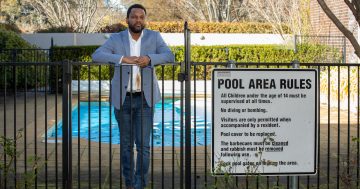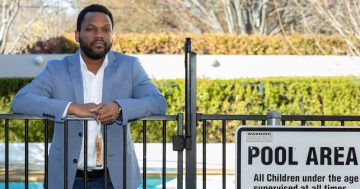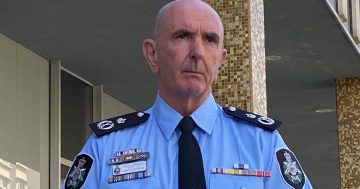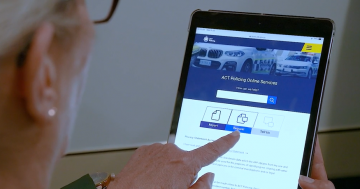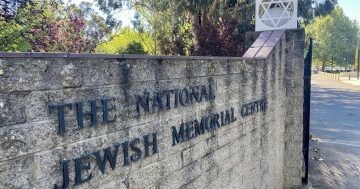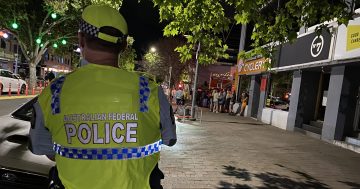
After arresting Tuck for trespassing at his own home, ACT Policing has subsequently met with outraged community groups. Photo: Michelle Kroll.
ACT Policing has met with African community groups in the wake of the outcry over a Zimbabwean-born Australian man being arrested for trespassing at his own home.
Region first reported on 1 July how Narrabundah man Tuck (he only wants to be identified by his nickname) was resting by the pool and BBQ area of his townhouse complex when a neighbour confronted him to say he didn’t belong there.
The neighbour then called the police, who immediately arrived at the complex – five officers in three vehicles – and arrested Tuck on suspicion of trespassing.
They subsequently unarrested him once they spent 10 minutes rummaging around his home to determine he did, in fact, live where he said he did.
Tuck was holding keys to his home and the pool area and showed them to the police when they arrived.
Police have defended their actions and have accused Tuck of being “belligerent” with them, but Tuck believes he was racially profiled and has lodged a formal complaint against the police.
An official investigation is now underway.
The African Australian Advocacy Centre (AAAC) and the African Australian Council ACT (AACACT) expressed serious concerns over the incident, with some members saying police in the ACT have difficulty dealing with their communities.
ACT Policing met with the groups’ representatives on the weekend to discuss their concerns.
Police, however, have not yet made any further contact with Tuck over the incident.
Speaking with Region on Monday (15 July), Tuck said some group members had told him that they had asked ACT Policing to apologise for the incident, for the officers involved to be held to account, and for additional training to be provided to police about how to deal with multicultural communities.
None of that is likely to happen – if at all – until the internal investigation into the matter has concluded.
“I’d rather it take its time and be investigated thoroughly,” Tuck said.
“It’s really been an emotional rollercoaster and it has taken its toll.
“The fact that police met with the community groups is a good thing. It’s good that there is at least a recognition that the community is not happy about what happened.”
ACT Policing issued a statement saying the meeting was focused on working together to improve relationships between the police and African people in Canberra.
Deputy Chief Police Officer Doug Boudry said the meeting provided an opportunity to strengthen relationships between police and the African community and to ensure everyone was able to voice their concerns and be heard.
“This was an opportunity to explain to the community the circumstances surrounding this incident while also hearing and understanding their perspectives,” he said.
“In hearing the communities’ concerns, I am confident we will learn and grow together, and it was particularly beneficial for us to learn more about the perspectives of African Australians when dealing with police.”
President of the AACACT, Yvette Poudjom Djomani, noted that the meeting was the first step in improving the relationships between police and the African community.
“We appreciate ACT Policing reaching out and taking the time to meet with us,” she said.
“This is a good first step in improving our mutual understanding and relationships.
“We want police and the broader community to understand the diversity of the Africans in Canberra and the positive contributions we make to society.”
Chair of the AAAC, Noel Yandamutso Zhihabamwe, described the meeting as important and productive.
“African people in Australia feel like they are living under a siege of racism,” he said.
“Having time to discuss our concerns with Doug … demonstrates that ACT Policing is committed to improving their understanding of our concerns and working with us.
“We look forward to the outcome of the review of this incident, which is underway.”
Both community members and ACT Policing agreed that improving the representation of African people within ACT Policing ranks and of the broader AFP is a shared goal.
Additionally, according to the police statement, it was agreed to start slowly by working together to give African communities opportunities to get to know their police better and learn how to raise issues of concern.
ACT Policing is also committed to working with the community to improve its cultural literacy, including through more regularly scheduled meetings and the identification of training opportunities for police.
As for Tuck’s neighbour who started the whole sorry saga, he’s keeping a very low profile.
“I think he’s in hiding,” Tuck said.
“The other neighbours here have been very good to me since the incident, and one lady on the residents’ committee apologised to me, saying what that guy did to me and how he talked to me didn’t represent their attitude.
“From their perspective, it’s not who they are.”












